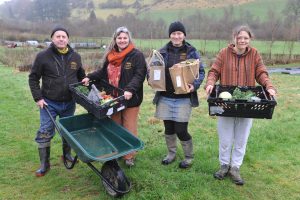BREXIT threatens major upheaval for Welsh agriculture, with small upland farms particularly threatened.
A report from the Public Policy Institute for Wales (PPIW) suggests that there is a massive risk to west and north Wales.
LIVESTOCK FARMING THREATENED
Its analysis suggests that the most likely changes in trading conditions would tend to disadvantage the competitive position of Welsh agriculture in its main current markets and trading competitors (particularly in sheep and beef).
The report also anticipates generally reduced levels and scope of public funding by comparison with those the sector has enjoyed in recent years.
However, within these challenging probable change scenarios, there are opportunities if farm businesses are enabled to respond adaptively.
Some farms and sectors face much greater challenges than others, which implies uneven structural change across significant areas:
- a decline in the economic viability of sheep production is likely, with these farm businesses especially vulnerable to changes in both market access arrangements and public funding support – this could increase pressure on rural services;
- accordingly, north and west Wales are likely to face stronger negative impacts than the south and east, where more potentially positive and diverse impacts can be expected among dairy, horticultural, mixed and other farm types.
MARKET RESPONSE UNCERTAIN
How key food and forestry processors and retailers respond to the Brexit process, and their willingness to invest in Wales and Welsh products, will be an important factor. Their patterns of operation may change in response to shifting economic and market conditions.
Managing the challenges faced is key, to prevent undesirable impacts on natural capital, landscape quality and community identity.
Three policy directions are recommended:
- Fostering resilience in farm and other land management businesses; supporting successful adaptation, enhanced efficiency, diversification, adding value and intergenerational transfer, as well as some moves from farming into other sectors;
- Investing in longer-term partnerships between government, food retailers, rural service providers, and commercial lenders to promote stronger business networks and SME infrastructure across Wales;
- Designing a future funding framework to support natural resource management and rural vitality in Wales.
THINK OUTSIDE THE BOX
Report author Prof Janet Dwyer, from the University of Gloucester, argued that while farming only employs a relatively small proportion of people directly, its success has a ripple effect across rural communities.
“People need to be more willing to think outside the box, to think about working together, think about understanding the way in which one person‘s business affects what other people do because farming affects the landscape, which affects tourism, which is an important sector in Wales, so a lot of these things are connected,” she said.
The CCRI Director and Professor of Rural Policy makes a number of recommendations to overcome these potential challenges. These include investing in better business planning and adjustment; careful succession planning for farms and small rural businesses; and policies to strengthen health and social services for those in the most remote areas.
“Conducting the work made me more aware of the importance of thinking ahead and planning for continued uncertainty, whatever the eventual political and economic outcomes of Brexit” said Professor Dwyer.
REPORT WELCOMED
A Welsh Government spokeswoman said it welcomed the report, saying it highlighted the possible impact of Brexit not just on trade and markets but on people‘s lives.
“However, Brexit also presents the opportunity to put in place new Welsh policy frameworks to help them adjust and thrive,” she said.
“We recognise that many of these changes will impact businesses in different ways and agree the best approach will be on an individual business level.”
She said they have already begun work to develop “sector readiness” programmes to support businesses to prepare for the change.
“We continue to press the UK government on the need for a multi-year transition period to enable all businesses to prepare and for clarity on the level of funding that Wales will receive after Brexit.”
Responding to the report’s findings, Paul Davies AM, Welsh Conservative Shadow Secretary for Rural Affairs, said: “We note with interest the recommendations of the report.
“Following our departure from the EU, more powers over agriculture will be transferred to the Assembly. “The Welsh Government now needs to focus on ensuring that they listen to rural communities and that they actually devolve power to people living in the countryside.”
Mr Davies view of ‘more powers’ being transferred to Wales does not appear to reflect the views of many Conservative Brexit enthusiasts within the UK Parliament, including David TC Davies, who chairs the Welsh Affairs Select Committee and David Jones, the former Secretary of State for Wales, whose appearance in Cardiff this week as a member of the Public Administration and Constitutional Affairs Committee was noticeable for his equivocal approach to the transfer of powers in areas of existing competence back to the Assembly after Brexit.
HARD BREXIT’S SEVERE IMPACT
The report’s publication coincided with the release of the Welsh Government’s own Brexit trade paper, supported by an economic impact analysis from Cardiff Business School, argues the Welsh economy is best protected by retaining full access to the European Single Market and membership of a customs union.
The paper sets out the severe impact a hard Brexit would have on Welsh jobs and the economy. If the UK were to move to World Trade Organisation (WTO) rules, the Welsh economy could shrink by 8% – 10%, which would be the equivalent of between £1,500 and £2,000 per person in Wales.
The trade paper calls on the UK government to provide evidence of how new trade deals would replace the benefits of access to the EU. The Welsh Government also wants decisions on new trading relationships with the EU and the wider world to be taken in partnership with devolved administrations to fully reflect the interests of all parts of the UK.
Launching the document, the First Minister said: “Welsh exports are worth £14.6bn each year, with 61% of Welsh exports and just under half of our imports going to and from the EU. Wales is currently attracting record levels of inward investment, which is largely due to our access to the EU’s 500m customers.
“As our trade paper highlights, moving to WTO rules and the imposition of tariffs could have a catastrophic impact on our lamb sector and on the Welsh shellfish industry, which currently exports around 90% of their produce to the EU.
“These hard facts underline what is at stake if the UK government fails to get the right deal for the UK or we crash out of the EU without one. Leaving the Single Market and the Customs Unions would be hugely damaging for Welsh businesses and jobs, with our agricultural, food producers and automotive sectors being particularly hard hit.
“I urge the UK government to give serious consideration to our proposals and work with us to develop a post-Brexit trade policy which protects Welsh jobs and the economy.”
NFU WELCOMES WG PAPER
Commenting on the document, NFU Cymru President Mr John Davies said: “As the paper rightly acknowledges, the decisions that will be taken about the UK’s future trading relationships with the EU27 and the rest of the world will be significant factors shaping our future prosperity. In my view, nowhere is this more true than in relation to agriculture, with around a third of our lamb crop and around three quarters of Welsh food and drink exports destined for the European market.
“Trade has consistently emerged as a top priority for our members during the Brexit negotiations. As far as I am concerned our future trading relationship must be one which gives us the full and unfettered access to the Single Market that we need, and I welcome the fact that the Welsh Government has made this call once again in today’s policy paper.
“The imposition of tariffs, under a no-deal scenario would impact lamb exports in particular, and under WTO rates chilled lamb carcasses would attract effective tariff rates as high as 46%, effectively shutting us out of European markets.
“Whilst there has been much talk of tariff barriers and the detrimental impact that they can have on trade, I was pleased to see the policy document making extensive references to the negative impact that non-tariff barriers can have on trade, particularly in relation to exports of food. When it comes to food and agricultural produce in particular, non-tariff barriers such as inspections at border posts in order to demonstrate compliance with technical regulations and standards, rule of origin, hygiene, veterinary and phytosanitary controls are all factors which increase costs and hinder trade.
“The paper also rightly acknowledges the damaging impact that the lack of clarity on future trade arrangements with the EU is having for business and nowhere is this truer than in agriculture where production cycles can often span a number of years. That is why we cannot wait much longer for an outline of what our future trading relationship with the EU27 is going to look like, if our members are to start planning for the future.”
Mr Davies concluded: “Although Brexit may well eventually give the UK the freedom to strike its own trade agreements with third countries other than the EU27, speaking as a Welsh farmer, the immediate priority for the UK Government has to be on securing a trade agreement with the EU27 that is free from tariff and non-tariff barriers, and encompasses all sectors including agriculture.”


















Add Comment